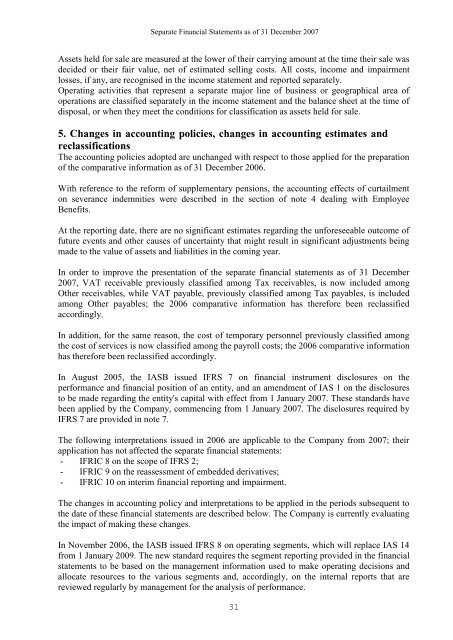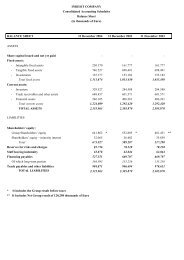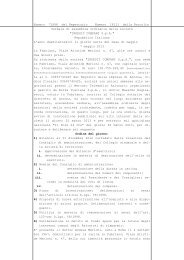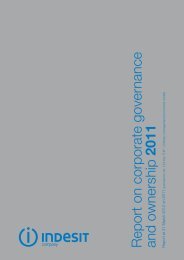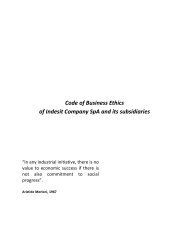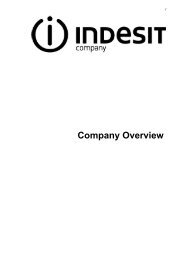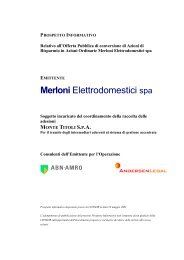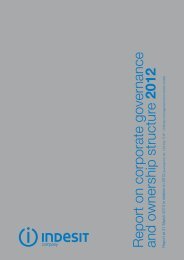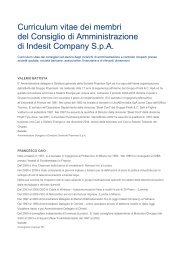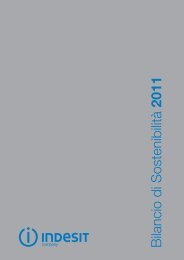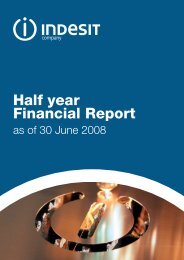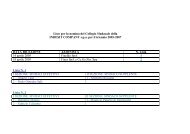Separate Financial Statements 2007 - Indesit
Separate Financial Statements 2007 - Indesit
Separate Financial Statements 2007 - Indesit
You also want an ePaper? Increase the reach of your titles
YUMPU automatically turns print PDFs into web optimized ePapers that Google loves.
<strong>Separate</strong> <strong>Financial</strong> <strong>Statements</strong> as of 31 December <strong>2007</strong><br />
Assets held for sale are measured at the lower of their carrying amount at the time their sale was<br />
decided or their fair value, net of estimated selling costs. All costs, income and impairment<br />
losses, if any, are recognised in the income statement and reported separately.<br />
Operating activities that represent a separate major line of business or geographical area of<br />
operations are classified separately in the income statement and the balance sheet at the time of<br />
disposal, or when they meet the conditions for classification as assets held for sale.<br />
5. Changes in accounting policies, changes in accounting estimates and<br />
reclassifications<br />
The accounting policies adopted are unchanged with respect to those applied for the preparation<br />
of the comparative information as of 31 December 2006.<br />
With reference to the reform of supplementary pensions, the accounting effects of curtailment<br />
on severance indemnities were described in the section of note 4 dealing with Employee<br />
Benefits.<br />
At the reporting date, there are no significant estimates regarding the unforeseeable outcome of<br />
future events and other causes of uncertainty that might result in significant adjustments being<br />
made to the value of assets and liabilities in the coming year.<br />
In order to improve the presentation of the separate financial statements as of 31 December<br />
<strong>2007</strong>, VAT receivable previously classified among Tax receivables, is now included among<br />
Other receivables, while VAT payable, previously classified among Tax payables, is included<br />
among Other payables; the 2006 comparative information has therefore been reclassified<br />
accordingly.<br />
In addition, for the same reason, the cost of temporary personnel previously classified among<br />
the cost of services is now classified among the payroll costs; the 2006 comparative information<br />
has therefore been reclassified accordingly.<br />
In August 2005, the IASB issued IFRS 7 on financial instrument disclosures on the<br />
performance and financial position of an entity, and an amendment of IAS 1 on the disclosures<br />
to be made regarding the entity's capital with effect from 1 January <strong>2007</strong>. These standards have<br />
been applied by the Company, commencing from 1 January <strong>2007</strong>. The disclosures required by<br />
IFRS 7 are provided in note 7.<br />
The following interpretations issued in 2006 are applicable to the Company from <strong>2007</strong>; their<br />
application has not affected the separate financial statements:<br />
- IFRIC 8 on the scope of IFRS 2;<br />
- IFRIC 9 on the reassessment of embedded derivatives;<br />
- IFRIC 10 on interim financial reporting and impairment.<br />
The changes in accounting policy and interpretations to be applied in the periods subsequent to<br />
the date of these financial statements are described below. The Company is currently evaluating<br />
the impact of making these changes.<br />
In November 2006, the IASB issued IFRS 8 on operating segments, which will replace IAS 14<br />
from 1 January 2009. The new standard requires the segment reporting provided in the financial<br />
statements to be based on the management information used to make operating decisions and<br />
allocate resources to the various segments and, accordingly, on the internal reports that are<br />
reviewed regularly by management for the analysis of performance.<br />
31


